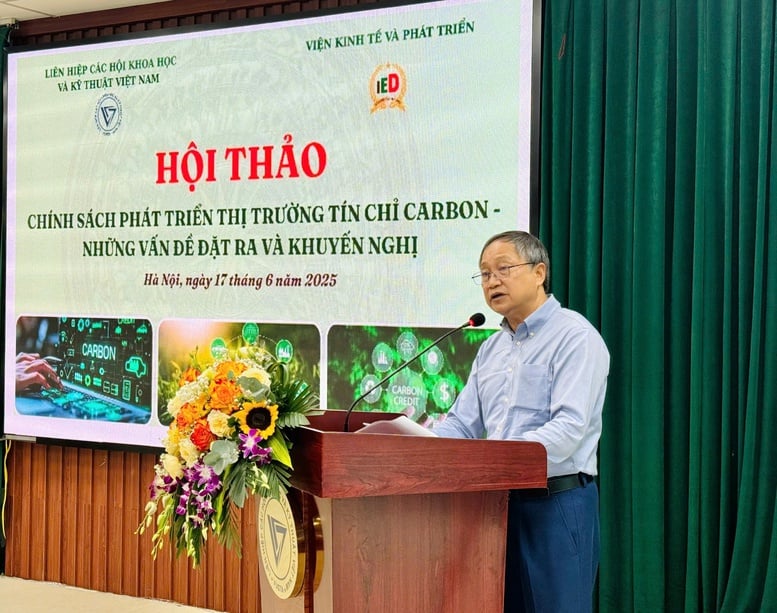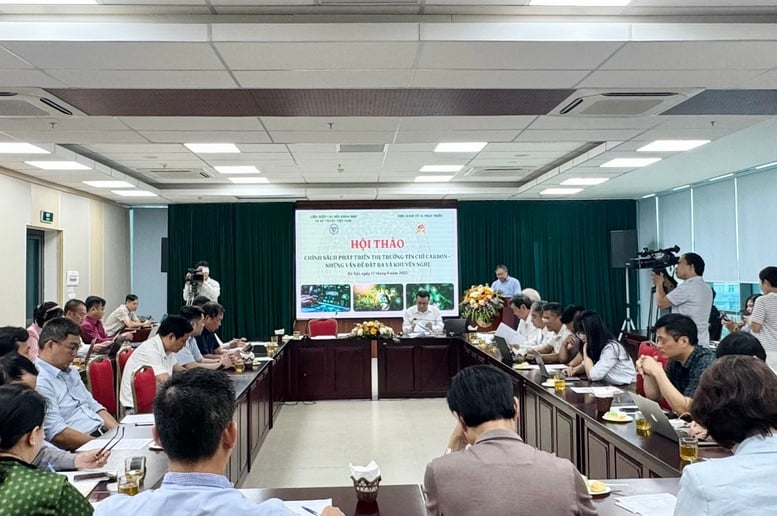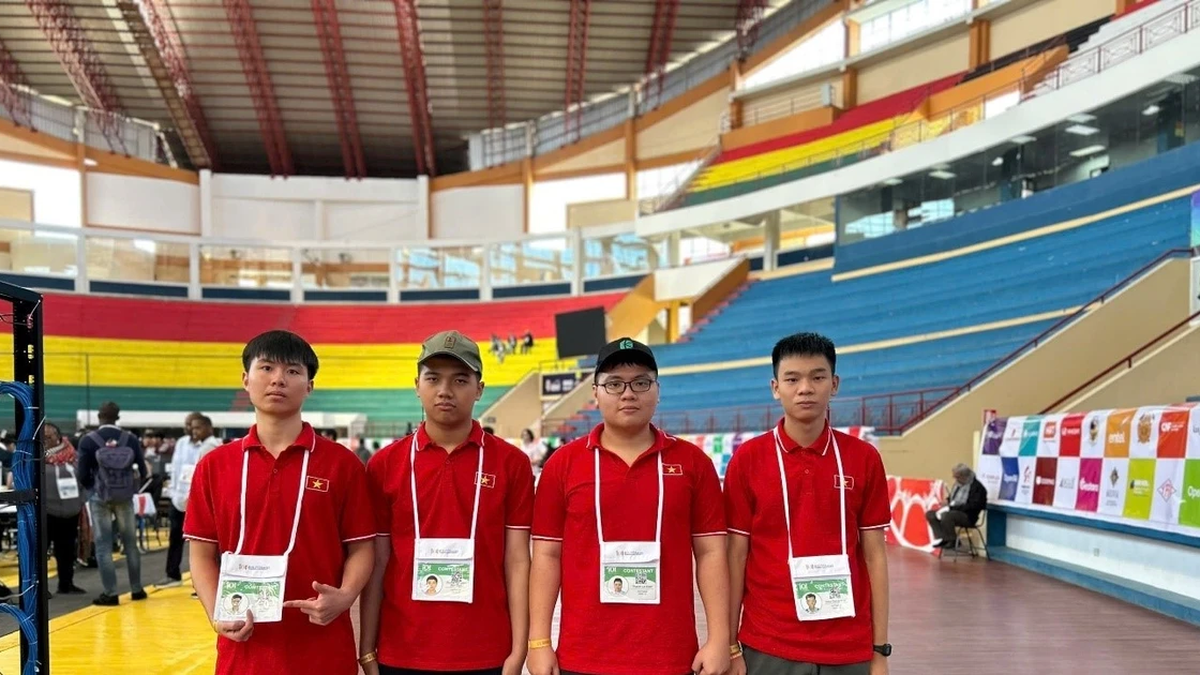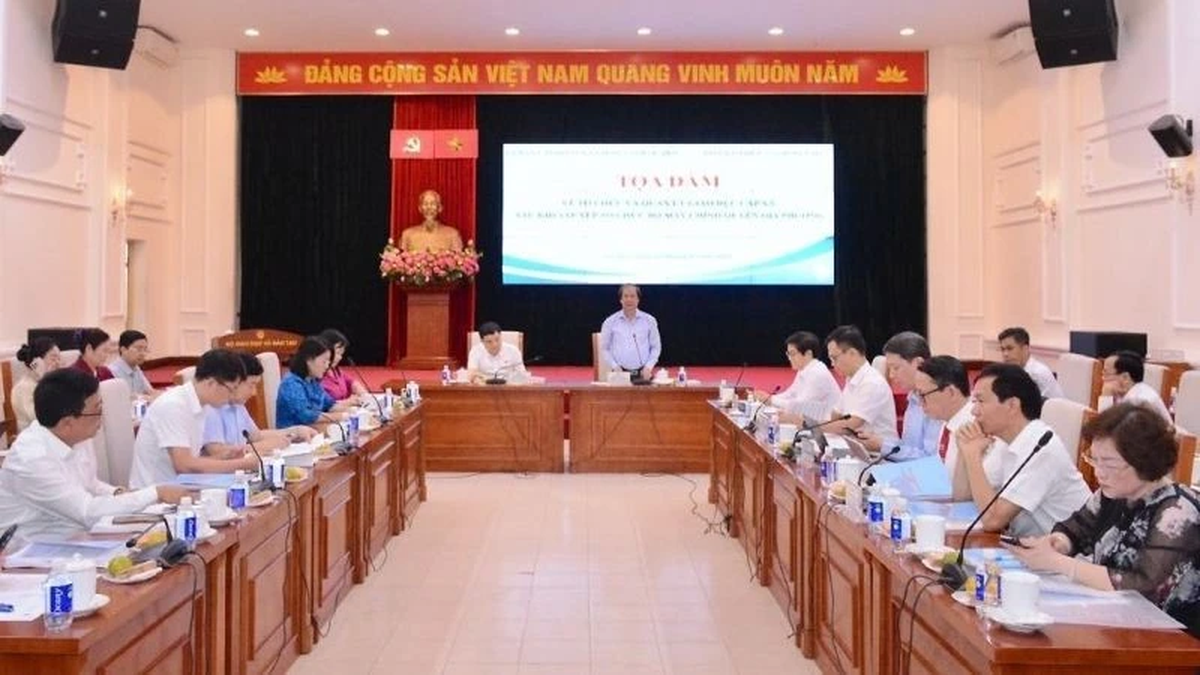Associate Professor Dr. Hoang Van Phu, Chairman of the Scientific Council of the Institute of Economics and Development, spoke at the Workshop - Photo: VGP/Thu Giang
On June 17, the Vietnam Union of Science and Technology Associations in collaboration with the Institute of Economics and Development organized the Workshop "Policy on developing carbon credit market - Issues and recommendations".
Speaking at the workshop, Associate Professor Dr. Hoang Van Phu, Chairman of the Scientific Council of the Institute of Economics and Development, emphasized: With the “green growth” model, the carbon credit market is the economic tool that determines the ability to promote greenhouse gas emission reduction and respond to climate change.
In essence, the carbon credit market is an economic mechanism that allows organizations and businesses to buy and sell the right to emit greenhouse gases, specifically CO₂, according to the “polluter pays” principle. This mechanism not only creates financial incentives to reduce emissions, but also contributes to the efficient allocation of resources among economic actors.
Around the world , many countries have implemented this model and achieved positive results in the transition to a low-carbon economy.
In Vietnam, the journey to build a carbon market has taken its first steps with the formation of an important legal framework. Specifically, the Law on Environmental Protection 2020 has officially recognized the existence of the carbon market; Decree 06/2022/ND-CP of the Government stipulates the roadmap and operating mechanism of the domestic emissions trading system; and Decision 232/QD-TTg dated January 24, 2025 approving the Project on developing the carbon market in Vietnam for the period 2025-2030.
However, the carbon credit market in our country is still in its infancy. Despite its great potential, especially in areas such as renewable energy, agriculture and waste treatment, this market has not been fully formed, activities are fragmented and lack connectivity.
Workshop "Carbon credit market development policy - Issues and recommendations" - Photo: VGP/Thu Giang
6 major challenges hindering the carbon credit market
According to experts, Vietnam's carbon credit market is facing six major challenges: an incomplete legal system; unsynchronized technical infrastructure; limited business capacity; lack of high-quality human resources; lack of business awareness of the benefits of the carbon market; and ineffective inter-sectoral coordination.
Dr. Nguyen Manh Hai, an economic expert, emphasized that the main direction for developing the carbon credit market is to overcome the difficulties and obstacles that still exist in the economy in forming and truly developing this market.
Accordingly, it is necessary to complete the legal and policy framework, including developing legal regulations on the carbon market (regulations on auctions, transactions, carbon credit certification, etc.) to ensure transparency and efficiency of the market; issuing technical guidelines related to emission measurement, reporting and verification (MRV); establishing regulations on inspection, monitoring and sanctions when there are violations.
Developing an emissions trading system (ETS) and carbon market, including: Establishing a domestic greenhouse gas emission quota trading system; identifying pilot sectors/fields to participate in the carbon market; building and operating a carbon credit trading platform.
In addition, it is necessary to connect with the international market, participate in international carbon market mechanisms such as the International Credit Mechanism; promote bilateral and multilateral cooperation to buy and sell cross-border carbon credits.
Strengthen capacity and awareness, organize training programs for businesses, management agencies and inspection organizations on emission inventory, credit trading and market operation. At the same time, promote propaganda so that the community and businesses clearly understand the role, benefits and opportunities that the carbon credit market brings.
In addition, the State needs to have preferential policies on tax, credit, and financial support to encourage businesses to invest in clean technology. In addition, it is necessary to promote the voluntary carbon credit mechanism (VCM) for pioneering businesses.
Dr. Ho Cong Hoa, Academy of Policy and Development, said that Vietnam is facing a strategic moment to shape the carbon market in line with the low-carbon economic development orientation and Net Zero commitment by 2050.
Despite the initial legal framework, building an efficient, transparent and internationally integrated emissions market system still requires more concrete and drastic steps.
Experience from previous countries shows that the decisive factor for success lies in a comprehensive and flexible legal framework, strict monitoring and sanctioning mechanisms, along with the active participation of the private sector and financial institutions. In particular, a transparent quota allocation mechanism, tax policies and strategic use of market revenues will be the levers for the long-term development of the market.
According to Dr. Ho Cong Hoa, Vietnam needs to review, revise and supplement missing or unclear contents in the draft Decree amending Decree 06/2022/ND-CP and the Decree on Carbon Trading Platform, especially in areas such as: Legal positioning of carbon goods, quota auctions, international offset and credit mechanisms, sanctions and disclosure of violations, use of revenue sources, and international linkages according to Article 6 of the Paris Agreement.
At the same time, building a strong inter-sectoral coordination mechanism and investing in data and monitoring systems (MRV) is a prerequisite for the market to operate transparently, responsibly and attract domestic and foreign green investment.
Thu Giang
Source: https://baochinhphu.vn/dinh-hinh-thi-truong-tin-chi-carbon-doi-hoi-the-che-manh-102250617130251138.htm




































































































Comment (0)